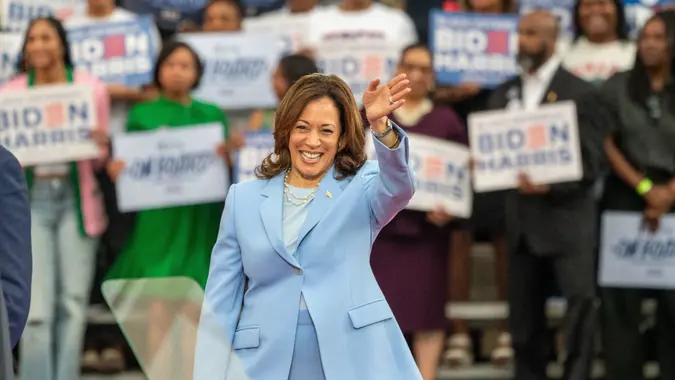3 Social Security Changes That Could Impact the Wealthy If Harris Is Elected

Commitment to Our Readers
GOBankingRates' editorial team is committed to bringing you unbiased reviews and information. We use data-driven methodologies to evaluate financial products and services - our reviews and ratings are not influenced by advertisers. You can read more about our editorial guidelines and our products and services review methodology.

20 Years
Helping You Live Richer

Reviewed
by Experts

Trusted by
Millions of Readers
The 2024 presidential election will he here before you know it, and many are curious about the potential policies of the incoming president. For older Americans, some of the focus has been on Social Security and its fate.
To help sort through the noise, GOBankingRates spoke with financial experts to find out their opinions on what a Harris administration could mean for Social Security and the rich.
Anthony Termini, an expert contributor at Annuity.org, set the stage for the discussion: “The central issue around Social Security comes directly from the Social Security Administration itself. Its most recent trustees’ report is very straightforward in saying that reserves are projected to be depleted in [2035].
“At that time, the income from payroll tax deductions won’t be sufficient to pay 100% of the projected benefits owed to recipients.” The revenue would be able to cover only 83%, according to the trustees.
Here are three potential changes to Social Security that could come under a Harris administration.
Raising the Taxable Earnings Base
The potentially biggest change that could affect the wealthy is an increase in the taxable earnings base.
The income limit in 2024 is $168,600. The Biden administration would like to reinstate a tax for those making more than $400,000.
This change would leave a so-called “donut hole” where earners making between the $168,600 and $400,000 would not face additional tax, but those richest earners would pay the standard $12.4% on earnings above $400,000.
Termini added context to the potential impact: “The Congressional Research Service … estimated in 2021 that increasing the limit to just $250,000 would raise about $662 billion over 10 years. So, it seems that [Harris’] support of the higher limit could raise even more revenue for the program.”
Expanding Coverage and Support for Retirees
Aaron Cirksena, founder and CEO at MDRN Capital, suggested that Harris’ approach to Social Security aligns closely with the current administration’s policies, “meaning no benefit cuts and expanding coverage to offer more support for retirees.”
This focus on expanding coverage could lead to changes in how benefits are calculated or distributed, potentially affecting higher-income retirees. However, the specifics remain to be seen.
Changes in Payroll Tax Collection
Cirksena also hinted at possible changes in how Social Security is funded.
“Therefore, there could be a change in payroll tax collection,” he said.
Termini provided more detail on how this might work: “Vice President Harris has endorsed the current administration’s plan to create additional funding for Social Security. That plan calls for raising the taxable earnings base – the income limit from which FICA taxes (federal payroll taxes) are deducted.”
This change in payroll tax collection could have a significant impact on wealthy Americans.
Termini said, “About 6% of all wage earners [would] be subject to the higher limits. That represents fewer than 3 million people. But for them the burden [would] be considerably less onerous than for other workers.
“This is because they [would] be paying the same 7.65% rate as the lowest wage earners in the country. The burden of financing Social Security [would] remain the same for poor and middle-class workers. Wealthy Americans [would] pay more. They [would] just feel less pain than folks who make less money than they do.”
The Road Ahead
While these potential changes could impact wealthy Americans, there’s an important caveat: Social Security reforms would require congressional approval.
As the election gets closer, the debate over Social Security and its future will most likely intensify, with potentially significant implications for wealthy Americans and the broader population alike. It’s one to watch.
Editor’s note on election coverage: GOBankingRates is nonpartisan and strives to cover all aspects of the economy objectively and present balanced reports on politically focused finance stories. You can find more coverage of this topic on GOBankingRates.com.
 Written by
Written by  Edited by
Edited by 
























